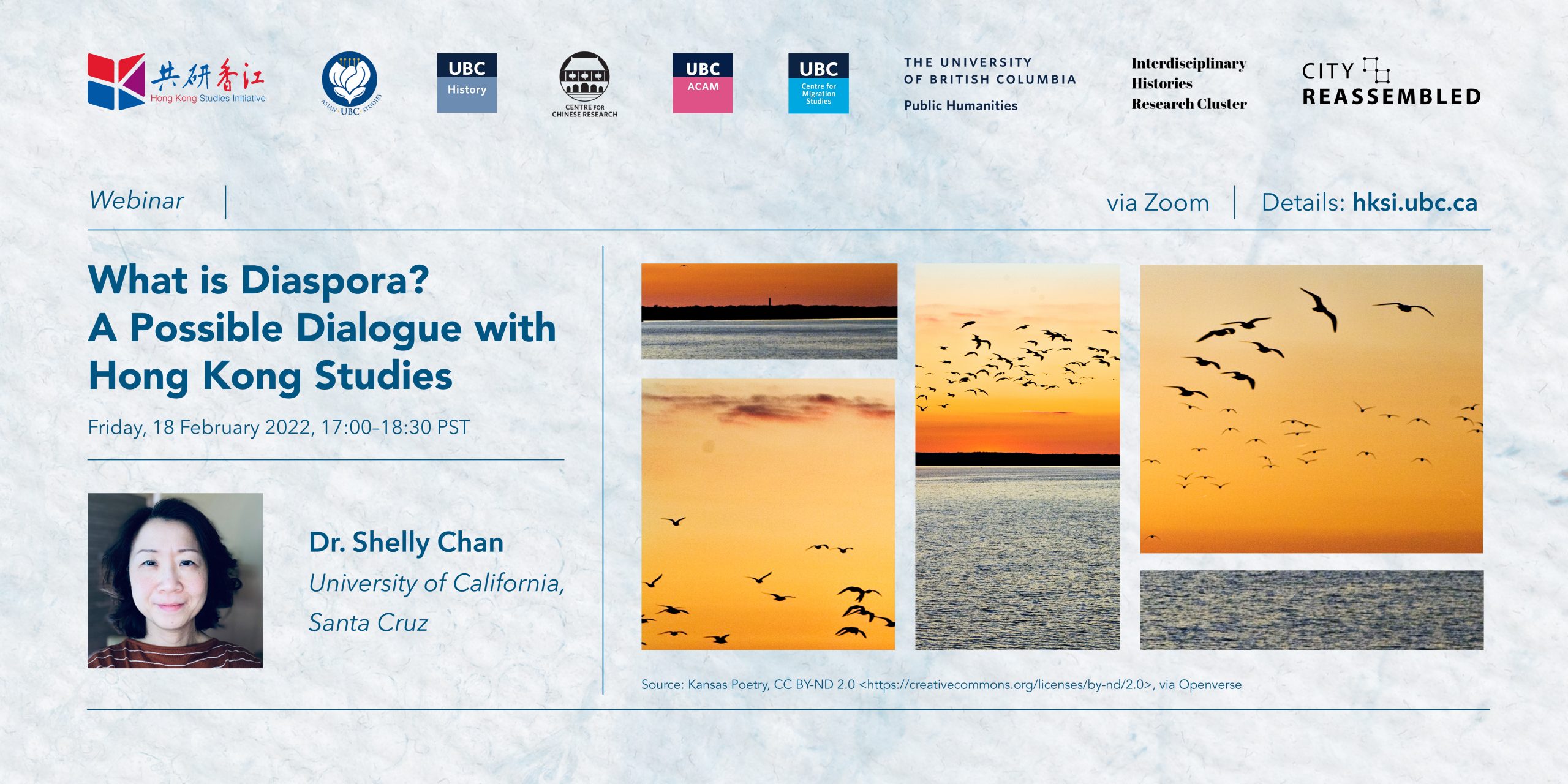[Updated 20 Feb 2022: For those who might have missed this webinar, here are the webcast and the photos.]
Webinar
Friday, 18 February 2022, 17:00–18:30 PST
What is Diaspora? A Possible Dialogue with Hong Kong Studies
Dr. Shelly Chan, University of California, Santa Cruz
via Zoom
A City Reassembled event
Registration required
Recent discussions about a “Hong Kong diaspora” point to a new way to understand the city at a significant moment of transition—one that brings together diaspora studies and Hong Kong studies. What does “diaspora” describe and conceptualize? As a global field of Hong Kong studies begins to coalesce in Canada, the U.S., and the U.K., what can “diaspora” teach us about Hong Kong, and what can Hong Kong teach us about “diaspora”?
This talk will be suggestive. It will outline how diaspora has served as a mode of social, cultural, and historical analysis about movements, and how a dialogue may benefit both diaspora studies and Hong Kong studies. From the early associations with forced exile and long-distance trade, diaspora studies have provided us with a distinct vocabulary—displacement, hybridity, roots, and routes—to describe movement as “dispersion,” and that the sense of being “outside” of a real or imagined homeland can be a powerful basis for culture and identity. In global history and culture, diasporas have also been a force no less important than nations and empires, transforming not only individuals and families, but also broader politics, economics, and societies. Yet, in many state-centered narratives, the Chinese diaspora, for instance, remains monolithic and derivative, its status subordinated to that of locals, natives, and citizens. Restoring agency to diasporas, without sacrificing their diversity and complexity, is the foundation for building meaningful conversations about a Hong Kong diaspora. There are now many well documented signs of Hong Kong’s specificity and ambiguity, from being on the verge of “disappearance” (Abbas) to being on the “edge of empires” (Carroll) and to being an “in-between place” (Sinn). For diaspora studies, an attention to Hong Kong calls for a deep engagement with positionality (being “outside”) rather than ethnicity (being “Chinese”). For Hong Kong studies, thinking through diaspora helps re-imagine the city as a point of departure and re-entry, a site of integration and fragmentation, and a perspective on reality from the inside out and the outside in.
Shelly Chan is Associate Professor of modern Chinese history at the University of California, Santa Cruz. Her current research focuses on the rise and disappearance of Nanyang the “South Seas,” a migrant and oceanic geography connecting China and Southeast Asia from the eighteenth to the twentieth centuries. Her recent book, Diaspora’s Homeland: Modern China in the Age of Global Migration, was published by Duke University Press in 2018 and shortlisted for the International Convention for Asian Studies (ICAS) Humanities Book Prize in 2019. Chan has previously taught at the University of Wisconsin-Madison (2011–2020) and the University of Victoria (2009–2011). She received her Ph.D. from UC Santa Cruz and her M.A. and B.A. from UBC.
This webinar is organized by the UBC Hong Kong Studies Initiative and co-sponsored by: Department of Asian Studies, Department of History, Centre for Chinese Research, Centre for Migration Studies, Asian Canadian and Asian Migration Studies, Public Humanities Hub, and the Interdisciplinary Histories Research Cluster.
Registration for: “What is Diaspora? A Possible Dialogue with Hong Kong Studies”
Registration for this event is now closed.
